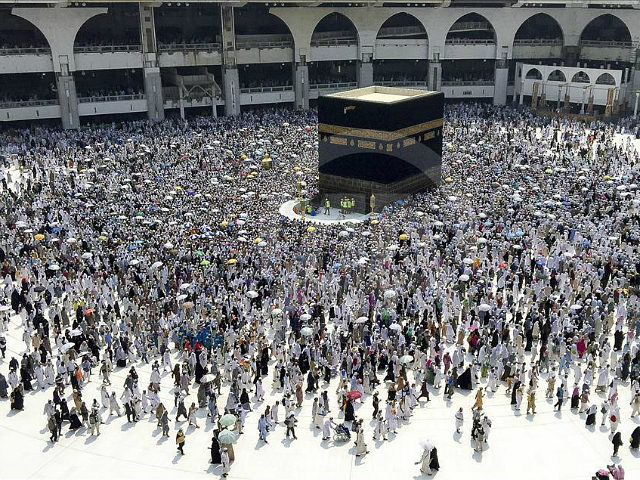According to the Saudi-led coalition fighting the Iran-backed Houthi insurgents in Yemen, the Houthis launched a ballistic missile at Mecca on Thursday, but the coalition was able to bring it down about 40 miles short of the Muslim holy city.
Reuters quotes Saudi state news agencies saying the coalition also conducted a retaliatory strike against the launch site.
The Houthis conceded through their official news agency that a Burkan-1 ballistic missile was launched into Saudi Arabia, but they said the target was the King Abdulaziz International Airport in Jeddah, not Mecca.
The King Abdulaziz International Airport is not only Saudi Arabia’s busiest civilian airport, as Reuters observes, but it’s also a major travel hub for the entire region. Already one of the largest airports in the world, it is currently undergoing an expansion to handle 30 million passengers per year. The Houthis are, therefore, saying they were merely trying to kill thousands of civilians instead of blowing up Mecca.
This was not the first Burkan-1 missile strike from Yemen into Saudi territory. A launch on October 11 targeted King Fahd Air Base near Taif. According to the Saudi Press Agency, it was the 18th missile attack on Saudi Arabia’s southern provinces since 2015, all of them intercepted successfully. The longest-range attack conducted by the Yemeni rebels hit a Saudi missile base some 350 kilometers from the Yemeni border.
The Houthis insist that some of these missiles were not intercepted and caused significant damage to their targets. Deutsche Welle points out that the Houthis claim the Mecca missile actually hit King Abdulaziz International Airport and caused “massive destruction,” but the airport was reporting no delays, diversions, or damage as of Friday morning.
The UK Daily Mail notes that Saudi Arabia has U.S.-made Patriot anti-missile batteries in its inventory.
Sheikh Abdullah bin Zayed, Foreign Minister of the United Arab Emirates, did not accept the Houthis’ denial of Mecca as their target. “The Iranian regime is supporting a terrorist group that fires its rockets on Mecca, is this an Islamic regime as it claims?” he asked via Twitter.
Coincidentally, U.S. military officials told NBC News on Thursday that Iran has supplied missiles to the Houthis, such as the coastal defense cruise missiles fired at U.S. Navy ships in the Red Sea.
“The head of U.S. Naval Forces Central Command, who is tasked with securing the waters off of Yemen, disclosed today that the U.S. and partner nations have intercepted five weapons shipments from Iran that were headed to the Houthis in Yemen,” NBC reported.
The first of those intercepts included coastal defense cruise missiles. Other munitions included “thousands of AK-47s, reverse engineered Iranian missiles similar to the TOW anti-tank missiles, sniper rifles, pieces of other equipment and higher end weapons systems,” according to Vice Admiral Kevin Donegan, who expressed confidence that only some of Iran’s shipments have been intercepted.
Donegan noted that some of these weapons are too sophisticated to master by merely reading the instruction manuals, so the U.S. believes Iran had a hand in training the Houthis to use them.
NBC quotes both Donegan and the head of U.S. Central Command, General Joseph Votel, saying that Navy counterattacks on Houthi radar sites did not permanently shut down their ability to launch missile attacks into the Red Sea. The U.S. military is therefore “working very hard” to find the Yemeni rebels’ mobile missile launchers, according to Donegan.

COMMENTS
Please let us know if you're having issues with commenting.